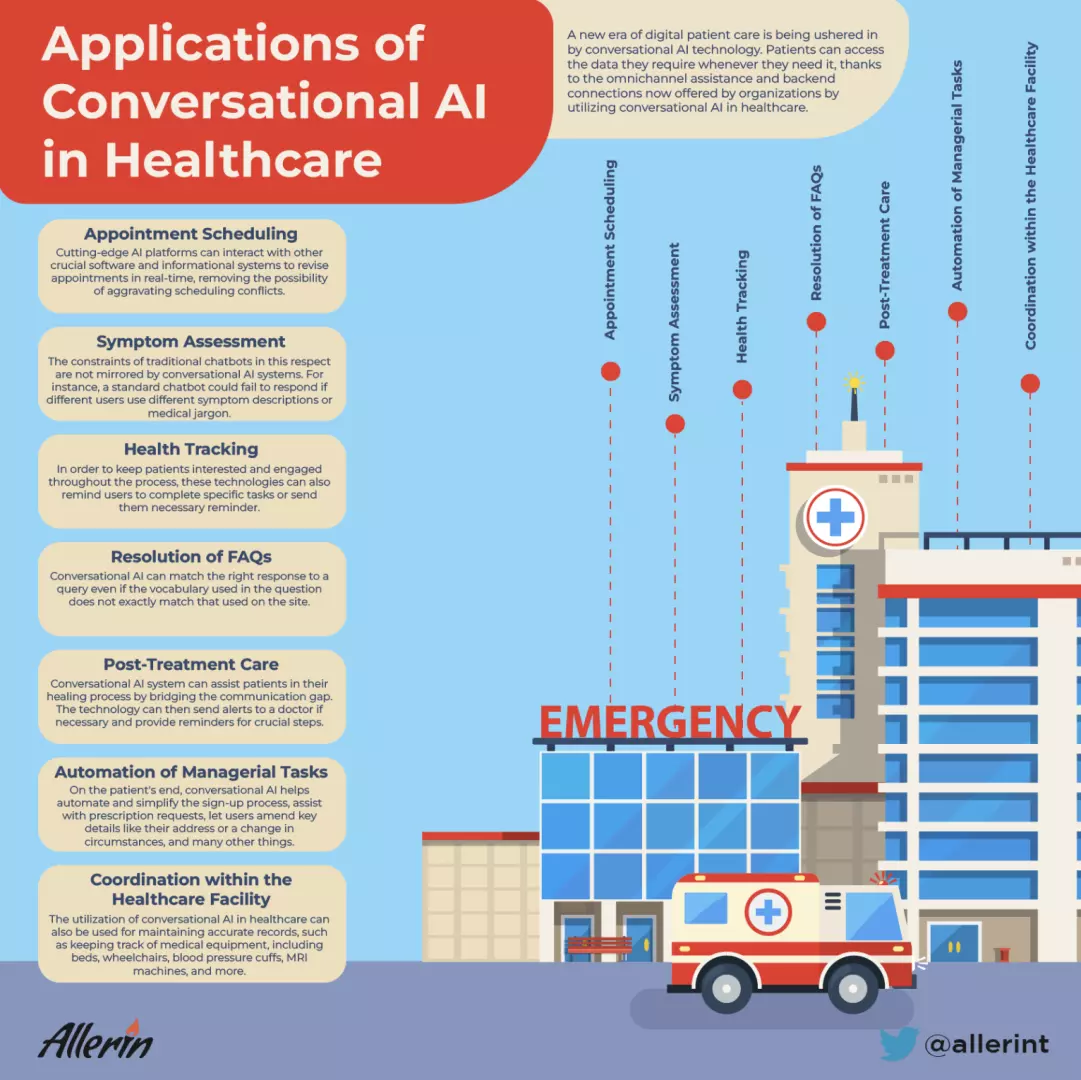Comments
- No comments found

A new era of digital patient care is being ushered in by conversational AI technology.
Patients can access the data they require whenever they need it, thanks to the omnichannel assistance and backend connections now offered by organizations by utilizing conversational AI in healthcare.
Technology advancements and new technologies have always had a significant impact on medicine. Medical technology has gone a long way, from the leeches, syringes, and scary trepanning machines of the past to the sophisticated medicine and robotic procedures of the present. The rise of artificial intelligence systems, such as conversational AI, is one of the more fascinating recent developments of AI in healthcare.
The delivery of healthcare services is perpetually evolving as virtual healthcare becomes acceptable, if not necessary. For many years, modern industrial societies were the primary focus of healthcare innovation, and hospitals with cutting-edge technology and conventional service delivery models were given top priority. Once you "step in" to a healthcare provider, modern healthcare systems work relentlessly to provide a bubble of care. However, healthcare services can now be liberated from the limitations of geographical location and conventional physical sites, thanks to the utilization of conversational AI in healthcare.
We now have the computational resources, memory space, and technological expertise needed to design affordable, human-like conversational interactions with robots for the first time ever in history. Advanced automation, artificial intelligence, and natural language processing (NLP) are integrated into conversational AI to enable technology to comprehend and interact with humans in their language. Think of it as the chat browser's brain because, like a human brain, it can be flexible, powerful, and capable of learning to engage in sophisticated discussion.
Conversational AI can impact the healthcare sector significantly, and in many areas, it already has. Conversational AI, when used properly, can enhance operational effectiveness and clinical outcomes and ease the workload of the healthcare staff.
Since the advent of conversational AI, its new use cases for various industries have been popping up. Some of its applications for the healthcare industry are listed below:

One of the healthcare facilities' most challenging yet vital tasks is booking appointments. Although online appointment software is now widely used, many patients disregard it in favor of calling the clinic since the former is often rigid and confusing. In contrast, conversational AI systems make it simple for patients to make appointments without the hassles of a complex user interface. Patients may effortlessly arrange an appointment with the practitioner of their choice, alter the time of an existing appointment, or even cancel it. Furthermore, cutting-edge AI platforms can interact with other crucial software and informational systems to revise appointments in real time, removing the possibility of aggravating scheduling conflicts. Conversational AI can do more than just deal with consultations; it can also send alerts and other important information, such as if a patient needs to bring a certain document to the appointment or if they need to bring someone to help them after surgery.
For symptom assessment and medical triaging, conversational AI can be used to determine the appropriate treatment. These systems can be utilized as step-by-step diagnosis instruments by guiding the user through a series of questions and enabling them to report their symptoms coherently. Some symptoms may indicate a major issue that needs to be addressed immediately. Still, most of the time, it just takes a prompt and accurate diagnosis or an appointment for more inspection. The constraints of traditional chatbots in this respect are not mirrored by conversational AI systems. For instance, a standard chatbot could fail to respond if different users use different symptom descriptions or medical jargon. One patient may refer to having the "flu" while describing the signs of a common cold. Furthermore, non-native speakers might not be familiar with the proper medical terms for particular organs or ailments. In these circumstances, conversational AI is considerably more adaptable and uses a wide database of data and knowledge resources to prevent diagnostic mistakes.
Seeing a doctor can be a frightening experience for some people since they often stress about their symptoms and feel vulnerable when in the hands of medical professionals. Patients can ask for particular data, such as what specific actions they should be doing to achieve their health objectives or when they need to take their prescription, using conversational AI systems to track their progress towards their personal health goals, such as body weight, mood, or fertility. In order to keep patients interested and engaged throughout the process, these technologies can also remind users to complete specific tasks or send them necessary reminders.
Often, patients have urgent issues that need to be addressed immediately but don't always require a professional's help. Most customers favor self-service over interacting with a person. Since it solves many of the problems that frequently arise with FAQ (frequently asked questions) sections on healthcare sites on the internet, such as having to scroll through multiple pages or finding the right answer for a specific question, conversational AI is the ideal method of self-service in the healthcare industry. This problem is resolved by smart conversational interfaces, which employ NLP to provide appropriate answers to queries without the patient having to search for them elsewhere. Additionally, conversational AI can match the right response to a query even if the vocabulary used in the question does not exactly match that used on the site.
Patients who are in post-treatment, perhaps after surgery, may have routine follow-up check-ups, but they are in charge of adhering to their post-treatment plan. However, it can negatively affect the patient's recovery outcomes if they misinterpret a post-care plan directive or neglect particular tasks required to be carried out. A conversational AI system can assist patients in their healing process by bridging the communication gap. The patient could, for instance, provide information on the post-care activities they have carried out and where they are in their treatment plan. The technology can then send alerts to a doctor if necessary and provide reminders for crucial steps.
In healthcare facilities, countless administrative duties must be performed regularly. While these jobs are eventually completed, they are not always done effectively. An intelligent conversational AI platform can streamline this process by enabling staff to make requests, send updates, and track progress all within the same system. On the patient's end, conversational AI helps automate and simplify the sign-up process, assist with prescription requests, let users amend key details like their address or a change in circumstances, and many other things.
Employing conversational AI, employees can quickly and easily acquire various data, including lab results, recommended prescriptions, and scheduled appointments. This results in time efficiency, allowing medical professionals to concentrate on other, more crucial activities. More importantly, it minimizes interdependence across teams because staff members can quickly get the data they need without contacting other departments within the organization and waiting for a response.
Conversational AI in healthcare can also be used for maintaining accurate records, such as keeping track of medical equipment, including beds, wheelchairs, blood pressure cuffs, MRI machines, and more.
Innovative medical advancements can greatly benefit emerging technologies like conversational AI since they improve accessibility and provide customized experiences for patients and healthcare professionals. In the following decade, the existing doctor scarcity is anticipated to double. Therefore, while conversational AI platforms cannot and should not substitute physicians, they can certainly assist in light of the industry's growing labor scarcity. The benefits of conversational AI in healthcare will certainly increase and use cases will keep growing as the underlying technology develops to ever-higher degrees of sophistication.
Naveen is the Founder and CEO of Allerin, a software solutions provider that delivers innovative and agile solutions that enable to automate, inspire and impress. He is a seasoned professional with more than 20 years of experience, with extensive experience in customizing open source products for cost optimizations of large scale IT deployment. He is currently working on Internet of Things solutions with Big Data Analytics. Naveen completed his programming qualifications in various Indian institutes.
Leave your comments
Post comment as a guest